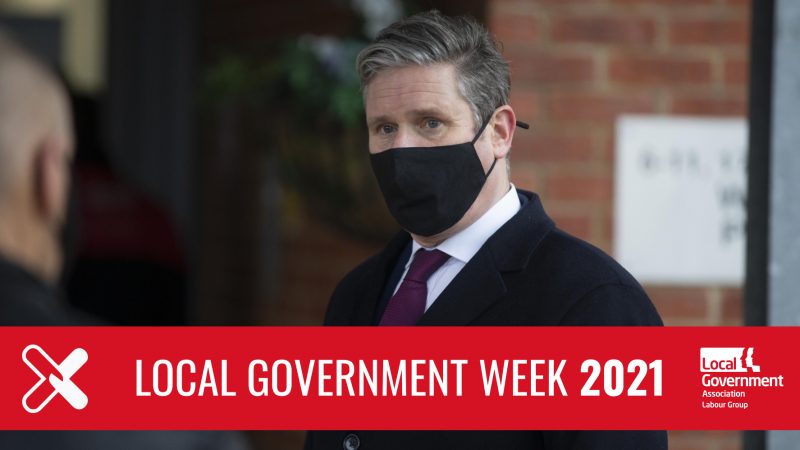
It’s difficult to believe that it has only been one year since the last Labour local government conference and LabourList takeover. One year ago, I wrote for LabourList on the four Labour leadership candidates as they set out their visions for localism and their relationship with us in local government. Many of us would have argued back then that local government was already the ‘fourth emergency service’, but little did we know just how important local public services would become to saving lives, not just improving them.
Councils throughout this year have stepped up to support their communities during this pandemic like never before. They have set up food delivery services, coordinated personal protective equipment for council and local care staff, helped improve coronavirus tracing efforts and housed thousands of rough sleepers off the streets and into safe accommodation. After a tumultuous year, which has tested both the new Labour leader and Labour local government, how has Keir lived up to his pledge to put us at Labour’s heart?
So far, Keir has put words into action. He and his team have shown new leadership through an impressive level of engagement with local leaders and by backing us on the big issues of the pandemic. One of his first events was a call with local leaders from across the country, which was a refreshing direct engagement that we had not seen in recent years.
At the same time, in between set-piece events, the shadow cabinet has continued to engage and learn from us. Whether on schools, food, private sector contracts or test and trace, the issues and solutions of this pandemic have all involved or been led by local councils, and the shadow cabinet has listened at every step of the way, taking local evidence and insight directly into parliament.
Local councils pointed out the flaws in the tracing programme and pushed for local involvement. In Hackney, we ran a tracing pilot and pushed successful tracing rates from 70% to the SAGE-recommended over 80%. Councils across the country have helped improve successful tracing rates in their areas. And against the backdrop of dodgy government private sector contracts with Tory donors, shadow cabinet member Rachel Reeves has rightly been leading a campaign against more outsourcing, citing Labour councils as an example of transparency and best practice.
Councils have continued to resource efforts to keep their communities safe, including working with the NHS to support vaccination efforts in their areas. Shadow Community and Local Government Secretary Steve Reed and Keir have made council cuts and council tax rises a vital part of their campaign to see more support for families, which has rightly highlighted that there will be no end to austerity or tax rises without financial support for councils.
Where the Tories left a vacuum of leadership on education and schools, local councils have acted. It was local councils that raised the issue of school safety and opening during the second wave, and the shadow education team stood by us. And it was also Keir who advocated on behalf of councils’ radical solutions to increase sustainable and active travel like low-traffic neighbourhoods, when even Labour MPs often failed to lead.
Last year, Keir pledged to support more devolution to “set local government free” and we saw him deliver a major speech on devolution. But, like I said in my previous article for LabourList, Westminster and Whitehall can feel as remote to the needs of London’s boroughs as they can in Carlisle or Plymouth. Devolution is not just about geography or a useful narrative to stave off the SNP. Devolution is about power: it must be seen as a vital tool in empowering communities to rebuild a better country and rebalance our economy.
The structural and cultural change in the party that Keir has talked about is still needed. Councillors contribute over £2m to the party every year as well as a vital activist base, yet local government is only represented by two seats on the party’s national executive committee. The lack of a national conference has understandably halted any much-needed internal reforms. A lot has changed culturally with the Association of Labour Councillors (ALC) and Local Government Association (LGA) Labour group now much more front and centre, but as soon as conference is back on the timetable, reform must be back on Keir’s agenda.
Finally, we are in a critical election year. London mayoral and assembly, Senedd and Scottish parliament, county, district and police and crime commissioner elections will all take place this year. Commentators will talk about these elections as Keir’s first ‘test’ – as if local elections are purely a polling opportunity for the national party.
But Labour’s success in 2021 will not just come from Westminster. It will come from Labour cities and town halls across the country, on the ground and in our communities. Keir needs to pivot party resources to those efforts, and then listen to what works. Because making Britain the best place to grow up and the best place to grow old will only happen if Keir and our leadership keep engaging with the Labour councils that are leading the way.
After these elections, we must move swiftly to harness the innovation happening at a local level. We must see Keir, with his shadow team, using all our energy and experience to develop fresh national policies that we can take into government, rebuilding the social and economic damage of the coronavirus pandemic.




More from LabourList
‘Unity or division’: Starmer’s message to voters in Gorton and Denton
Almost half of Labour members oppose plans to restrict jury trials, poll finds
‘How Labour can finally fix Britain’s 5G problem’